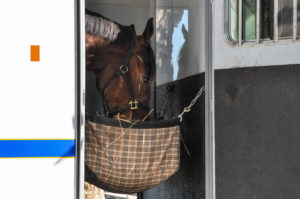
Feeding Fats to Horses: Not Just a Diet Fad
Fats serve many important functions for horses, from increasing calorie consumption to reducing gastric ulcer severity.


Fats serve many important functions for horses, from increasing calorie consumption to reducing gastric ulcer severity.

Are you and your horses heading south for the winter? Prepare in advance to keep your equine charges healthy during and after transport.

A trainer asks how to classify her horses’ workload when considering their nutritional needs.

Bales aren’t the only hay option. Here’s some information about different hay forms horse owners can consider.

Researchers know that feeding horses ground endophyte-infected tall fescue results in palmar artery vasoconstriction, so scientists tested whether broodmares could experience decreased blood flow to the uterus, which could negatively impact their foals.

Find out which horses are at the highest risk for feed-related choke and what you can do to reduce that risk.

While dietary CLA didn’t appear to reduce inflammation in yearlings’ knees following induction, synovial fluid analysis showed signs of reduced cartilage degradation and improved cartilage regeneration compared to controls.

Switch your horse’s feed type or amount gradually to minimize his risk of digestive upset. Plan any nutrient-dense dietary changes carefully to avoid health problems such as colic or laminitis and to allow for maximum nutrient digestion.

We must consider the breeds of our horses and ponies when planning their diets. Here’s a look at what we currently know about feeding major equid categories and where we’re heading.

Take steps to manage your horse’s weight and behavior while he’s cooped up.

Overgrazing, one of the most common threats to pasture and plant health, happens all too often on horse farms. Download this free report to learn about the signs and solutions to overgrazed pastures.

Does your performance horse need to pack on a few more pounds? Here are some tips to consider when managing a hard-keeping equine athlete.

Although owners are frequently warned against the consequences of feeding these carbs, horses need them in their diets.

Find out how some simple diet changes might help calm your hyperactive horse.

Lactating mares’ nutritional requirements increase drastically in order to maintain weight while providing nursing foals with enough critical nutrients.

Horses consuming crude protein at 12% of total dry matter intake excreted more nitrogen, which led to greater ammonia emissions.
Stay on top of the most recent Horse Health news with